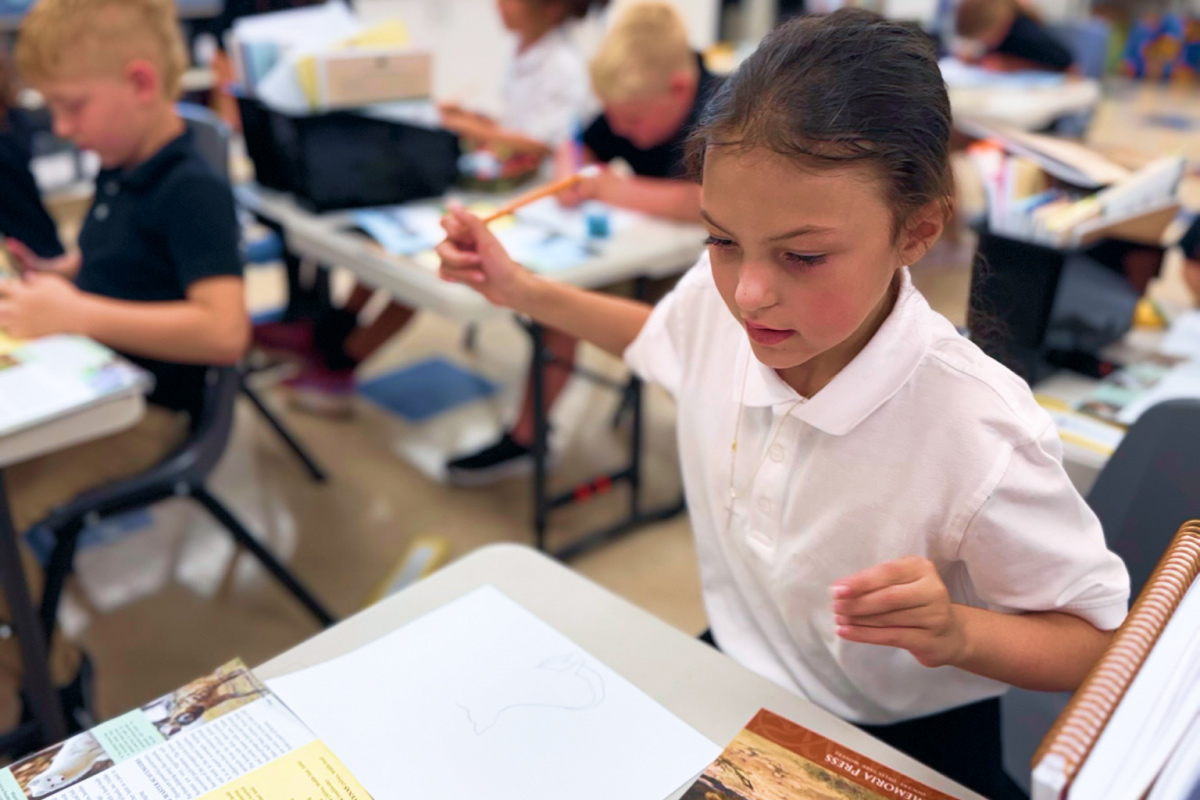If you’re still skeptical about why some parents withdraw their kids from traditional schools, Tom and Marci Sheckells’ story is hard to dismiss.
“Second grade was a complete loss,” said Tom Sheckells. “Not only a loss — it was a net negative, like we took steps back.”
The Sheckells knew their daughter Coraline was struggling, but they weren’t sure how concerned they should be. They communicated weekly with her teacher, who repeatedly assured them that everything was fine, despite refusing to provide any materials or resources for them to support Coraline at home.
As the school year progressed, Coraline’s frustration grew. She returned home disheartened each day until she finally began pleading with her mother to homeschool her. “She broke down crying, and she said, ‘Mom, I just can’t learn there. Can you please homeschool me?’” recalled Marci Sheckells.
It wasn’t until the end of the school year that they realized Coraline hadn’t grasped the basics of second grade. Concerned that promoting her to third grade prematurely would lead to a lifetime of feeling inadequate, they requested that the school hold her back, prioritizing her long-term success over keeping her with her peers.
The school refused.
“They wouldn’t have that,” said Tom Sheckells. “It was just, ‘No way.’” The teacher and principal effectively informed the Sheckells that Coraline would be a remedial learner for the rest of her K-12 education.
So when the Sheckells learned that their church was opening a new school, they knew they had to give it a shot.
Rogue Christian Academy emphasizes rigorous academics and personalized education, with a key focus on parental responsibility. The school works with families, respecting parents as the ultimate decision-makers for their children’s needs.
When the Sheckells met with RCA, they expressed concerns about Coraline’s lost second-grade year. Trusting their judgment, RCA placed her in second grade. A year and a half later, Coraline is now a thriving, confident third-grader who delights extended family members by reciting entire psalms in both Latin and English.
“It’s a beautiful thing to see her actually learning and excited to go to school,” said her mother. Her father characterized the school as “transformative.”
Imagine if every child had the confidence to learn and found joy in doing so. A closer look at RCA’s model can help us better understand how to make this a reality.
Parents want an active role in their children’s education
Like the Sheckells, Constance Bradley faced troubling experiences with her son’s journey through traditional education.
After two private schools failed to accommodate his individual needs, she enrolled him in a public school. Administrators assured her that the school had the resources to provide her son with the academic rigor he needed to keep him engaged.
What did that look like in real life?
“He was basically in a closet for eight hours a day with a stranger — a person I had never met or had any conversations with — who was helping him and one other student,” said Bradley. “He was completely removed from the learning environment.”
This had been happening for months before she became aware of it. She was astonished that the school had made such a significant decision regarding her child without informing her.
Bradley and the Sheckells are part of a growing number of parents who are challenging the traditional belief that institutions are the experts and should be trusted to make the majority of decisions regarding their children’s education.
“In the past, parents put their faith in the institution and assumed that everything would work out,” said Meredith Olson, president of VELA, a community of over 3,000 innovative education founders.
However, institutions don’t know students as well as their parents do, and many well-intentioned policies have backfired, shifting the focus of education toward funding and programs and away from the children themselves.
In the Sheckells’ case, they later learned that their school district received additional resources and funding based on the number of children performing below grade level.
“If a child falls enough behind, the schools themselves get more resources,” said Tom Sheckells. “You have a monetary funding mechanism for the kids to fall behind.”
Olson explained that parents have become more aware of these shortcomings and failures, especially after experiencing remote learning during the pandemic. They’re having more conversations about what education should look like for their children, doing more research, and becoming more aware of what’s happening at school — and what’s available elsewhere.
“They are also becoming more confident in their own knowledge,” said Olson. As that confidence grows, “they are more likely to take responsibility for their children’s educational journey.”
‘She hasn’t missed one day of school since the switch’
It’s no accident that when Bradley later founded Rogue Christian Academy, she made partnerships with parents a core value of the school.
“We look for parents who want that partnership,” said Bradley. “They understand that they’re the end-all, be-all in their child’s life for their education, and we’re just going to walk alongside them.”
It was precisely what the Sheckells had been searching for. Coraline’s teacher at her previous school treated collaboration with parents as either an annoyance or off-limits. When the Sheckells asked her to share the curriculum so they could prepare Coraline in advance, she declined.
“I don’t think I can share that information with you,” Marci Sheckells recalled the teacher saying. “We don’t want her to know ahead of time what she’s supposed to be learning.”
In contrast, RCA school officials respected the wish for Coraline to repeat the second grade. Later, when the Sheckells requested resources to support her at home, her RCA teacher worked collaboratively with them to identify beneficial materials.
“They’d say, ‘These are the resources we’re using,” said Marci Sheckells. “‘These are the ones that are actually working for her, and this is how you can obtain them yourself if you want to work on it more at home.’”
The school has a 24-hour communication response policy. If parents contact a teacher, that teacher must respond within 24 hours. Grades are posted and available for parents every Friday. And every month, the school holds an in-person open house where all the teachers and administrators are available to parents and students.
“You can tell we’re a team,” said Tom Sheckells, referring to their partnership with Coraline’s teacher. “So when we were working on something with her here, Coraline was working on it there, and the teacher was working on it with her, too. We’re all on the same page.”
Proof that it’s making a difference in Coraline’s life and happiness? “She hasn’t missed one day of school since the switch,” said her father.
Enough with the watered-down curriculum
Does it seem contradictory that the Sheckells enrolled Coraline, a grade behind, at a school boasting academic rigor?
They don’t think so.
Sign up for Stand Together's K-12 newsletter and get stories, ideas, and advice from changemakers who are transforming education across the country.
As parents, all their struggles with Coraline’s previous school had nothing to do with whether they believed she was capable. They already knew she was bright and could learn. The teacher and the administration doubted her abilities, not her parents.
In fact, she learned better at home than she did at school. “From the beginning, it seemed like the only thing she was learning was from home,” said her father. She could grasp concepts easily with her parents, but once she got to school, the pressure and stress caused her to forget everything she had worked so hard on.

Her teacher told her parents that medication was their daughter’s only chance for academic success. While medication can benefit some students with neurological challenges, the Sheckells didn’t agree with this for Coraline. They worried her struggle to learn the one-size-fits-all curriculum would pigeonhole her future.
“The words of the teacher were, ‘This is the curriculum I’m teaching. I’m teaching to the ones who get it, and the ones who don’t are sent to a resource program,’” said Marci Sheckells.
When they changed schools, the Sheckells weren’t looking for a place that would lower academic standards or make things easier for Coraline. Instead, they sought a school that would partner with them to challenge her and reignite her love of learning.
A healthy blend of rigor, high expectations, and personal connection
RCA has a unique blend of academic rigor, high behavioral expectations, and personal connection. This mix fosters confidence, teaching students to trust their ability to meet the world’s challenges and raise their own expectations.
“Every morning, students enter the classroom by shaking hands with their teacher,” said Bradley. “When they leave, the teacher thanks the students, and the students thank the teacher. It teaches respect as well as gratitude from beginning to end.”
The school is decidedly Christian. Each day begins with discipleship, including memorizing Bible passages, praying, or exploring the Old and New Testaments.
Bradley highlighted the deeper connections that form in these moments. “It’s really like we’re personally connecting during that time,” she said. “It may mean the discipleship lesson is out for the day and we’re just focusing on this one component that got brought up during prayer requests, and now we have questions that we need to answer.”
In RCA’s classical education model, students train to become lifelong learners. Instead of merely memorizing the “right” answers, they explore and solve problems, with each subject providing opportunities for progressively deeper understanding. They also study Latin as foundational for many other languages, including English. Beginning in third grade, they memorize entire passages from the Bible in Latin and English.
Technology use is limited to teachers, making even handwriting a challenge for students accustomed to using Chromebooks for everything.
Disrespect, whether toward peers or teachers, isn’t tolerated. The school uses natural consequences — if a student disrupts class, they give that time back through service in the classroom.
This model doesn’t work for every family. In the first few months of the first school year, 24 students were put on academic probation. Of those, 16 eventually left the school.
It is, however, working for the Sheckells.
The first two weeks were challenging, but the changes in Coraline’s confidence were almost immediate. “It was unbelievable,” said her father. “Concepts would stick, spelling words would stick, and math had actual building blocks to it. She could actually use those skills. It was such a quick turnaround, and it was such a confidence-based thing. They built her confidence.”
Every Friday, Coraline can’t wait to check her grades, which are consistently high. Her favorite subject is science, and even Latin is doable. The school’s high expectations have inspired her to raise her own expectations — and to believe she can achieve them.
“We tell everyone about the wonderful experience we’re having,” said Marci Sheckells. “We want everyone’s kids to be as happy as ours is.”
Even people in the community have noticed RCA students’ confidence and respectful behavior.
“It’s so fun,” said Bradley. “Going to sporting events, we’ll hear, ‘Oh, that must be an RCA kid.’ Within a year, community members can tell because our kids behave differently. They have learned to have a different level of expectation around them, and they carry it outside of our building.”
“That has grown my ‘why,’” she continued. “We could have a whole city of people who are aware of their surroundings, serving one another, helping out, and loving their neighbor. We can have people who see the world as bigger than themselves. I love watching the ripple effect of our students.”
Rogue Christian Academy is supported by VELA, which as part of the Stand Together community supports everyday entrepreneurs who are boldly reimagining education.
Learn more about Stand Together’s education efforts and explore ways you can partner with us.
